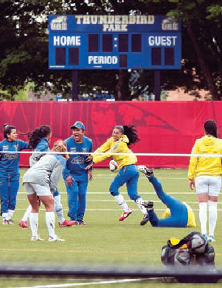LOOK BACK: 2015 was a roller-coaster year for B.C.’s companies and entrepreneurs in all sectors of the economy as chronicled in BIV’s summary of the year in business. It began with U.S. retail giant Target pulling the plug on its Canadian operations and continued with an ever-lengthening list of bottom-line challenges generated by plunging energy prices, a downbound dollar and quirky weather
Simons says Metro Vancouver is a good location for expansion, despite its crowded retail marketplace
Quebec-based Simons is joining the burgeoning local fold of high-end fashion retailers setting up shop in Vancouver, only its second location outside Quebec.
The family-owned retailer is building a 100,000-square-foot location at Park Royal South set to open October 15. The 175-year-old private company, founded as a dry goods store in Quebec City in 1840 by John Simons, has nine stores, eight in Quebec and one in West Edmonton Mall.
“Vancouver is a great city, and what I found travelling across Canada is that each city has its own style, and I think our unique assortment and our exclusive merchandise will really relate to the creativity of the Vancouver market,” said CEO Peter Simons, who represents the fifth generation of the Simons family.
Betting on World Cup business wins – in spite of FIFA fallout
Vancouver might have hosted the mother of all sporting events during 2010. But Penny Ballem, the City of Vancouver’s city manager, said the 2015 Women’s World Cup is an even bigger deal for the city.
“The actual media coverage is bigger than the Winter Olympics and Paralympics,” Ballem said.
In an ideal world, all eyes would be on the beautiful game. But attention has also been focused on the ugliness at Fédération Internationale de Football Association (FIFA) headquarters, after several high-ranking officials were arrested earlier this month on racketeering and bribery charges brought by the United States Department of Justice.

Most cities and corporate sponsors are hoping the positivity of the event will win out, but they’re also aware of the potential risk of being associated with an organization like FIFA.
“When we see something happening with FIFA where you see negative attachment to the FIFA brand, sponsors have to be careful that’s not being transferred to their brand,” said Ann Pegoraro, director of the Institute for Sports Marketing at Laurentian University.
Playing Dunbar’s lucrative flip side
Approximately 20% of Vancouver detached-housing sales can be defined as flips – the buying and selling of a property in less than 12 months – and Dunbar is the city’s hottest flipping market.
Dunbar, an established west-side Vancouver neighbourhood where the typical price of a house is now $2.27 million, accounted for 30 of the 328 detached-house flips in the city during 2014 and the first five months of this year, based on exclusive research done for Business in Vancouver by New Westminster’s Landcor Data Corp.

Dunbar average house prices rose 9.1% in the past year, which would equate to a theoretical return of approximately $200,000 for someone who had bought and sold a typical house in that period.
But the Landcor data suggests some savvy investors did much better than that.
For instance, a 1950-era house at 4086 West 30th Avenue was bought, held for 217 days and sold last June for $2.95 million, generating a $400,000 profit.
Residential development boom looms for Squamish
Several large residential projects on Squamish’s development horizon promise to increase the town’s appeal for residents who make the 45-minute commute to Vancouver and entrepreneurs who want to start businesses in the waterfront community.
The District of Squamish is nearing the end of a rezoning process that would allow two packages of district-owned land to house about 1,100 residential units.
District council unanimously supports rezoning the 100-acre oceanfront land and selling it to a group made up of local developer Bethel Lands Corp. and Texas-based Matthews Southwest.
The residential proposals come as Squamish residents and politicians mull controversial proposals that are poised to have an even bigger effect on the community.
Pacific Oil and Gasis proposing to build the $1.7 billion Woodfibre LNG project south of the town while other proponents are going through an environmental review in a bid to build the Garibaldi at Squamish ski resort 20 kilometres north of Squamish.
Farming, fisheries at risk from dry weather, low snowpack
In his 67 years living near the Cowichan River, chicken farmer Bob Crawford has never seen the river this low.
“We just went through haying; we’re about three weeks early,” he said. “Everything is drying out big time – our fields are drying out behind us as we hay.” 
British Columbia’s Ministry of Forests, Lands and Natural Resource Operations is warning that very dry conditions seen this early in the year could translate to a more severe drought later in the summer.
A warm winter means that snowpack is at historically low levels, partly because the snow has melted early. May and June have been unusually dry and warm.
With the snowpack acting as a natural reservoir that slowly feeds streams and lakes throughout the summer, that combination of conditions could mean bad news for industries like agriculture and fisheries.
Many B.C. farmers saw their crops ripen earlier than normal, and the unusually dry summer put a focus on the need to better manage water in the future. Several salmon runs were also lower than expected.
Profile of Jon Stovell, president, Reliance Properties

Photo: Rob Kruyt
“I’m really into micro-izing everything and simplifying life”




